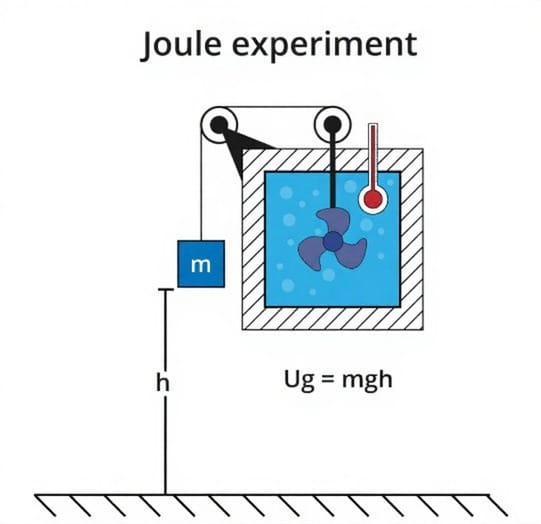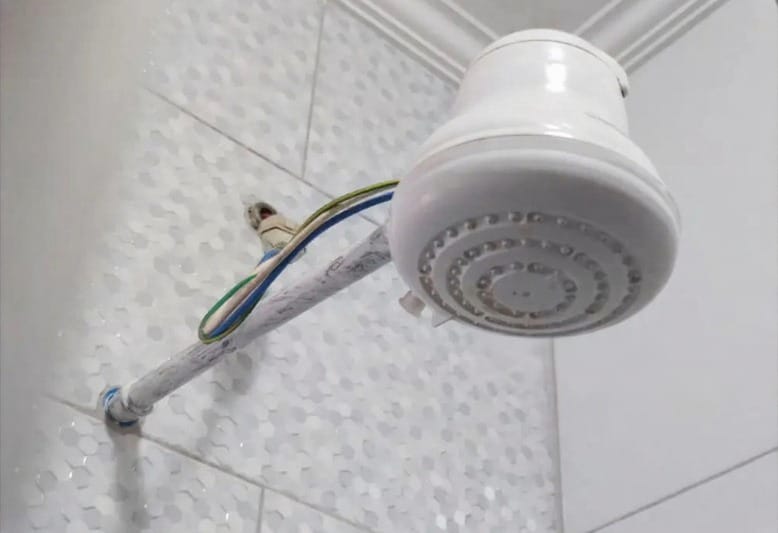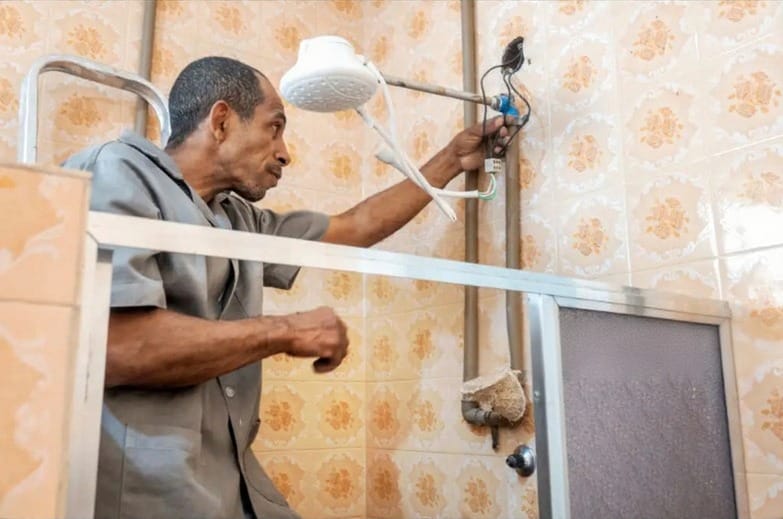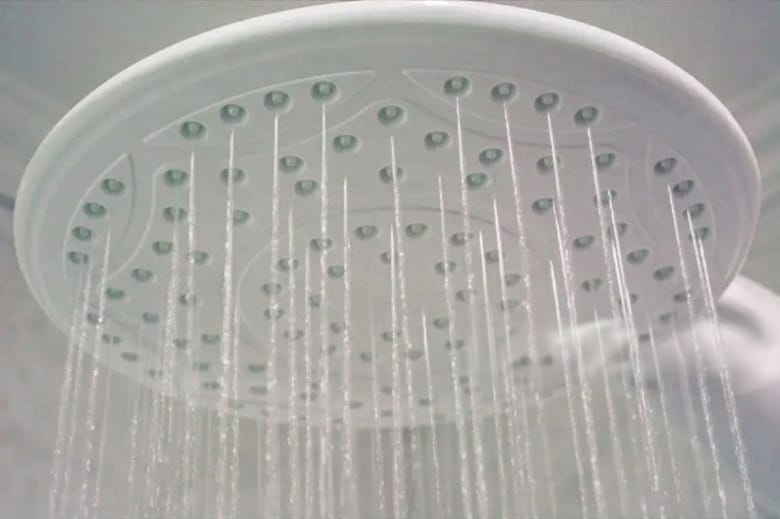Imagine arriving at your first hotel or guesthouse in Brazil, exhausted after long flight hours, wanting nothing more than a relaxing shower to refresh yourself. You open the bathroom door and encounter something that looks straight out of a science fiction movie: a small electric device connected directly to the showerhead, with exposed wires and a design that would make any European or American engineer question the laws of physics. Welcome to the fascinating world of the Brazilian electric shower!
If you’ve never heard of electric showers, prepare to discover one of Brazil’s most ingenious and controversial inventions. This small device has revolutionized how Brazilians bathe for over 50 years and continues to be a real puzzle for international visitors. Between fear, curiosity, and admiration, the electric shower has become an unofficial symbol of Brazilian creativity and practicality.
The Surprising History of Electric Showers in Brazil
How It All Began
The history of electric showers in Brazil dates back to the 1940s when the Cardal company launched the first model in the Brazilian market. At that time, most Brazilian residences didn’t have centralized water heating systems, a reality very different from European or North American countries.
The concept was simple and ingenious: heat water at the exact moment it passes through the shower, eliminating the need for reservoirs or central heaters. For a tropical country like Brazil, where hot showers are mainly desired during winter or in cooler regions, this solution proved perfect.
The Brazilian Bathing Revolution
Over the decades, electric showers evolved significantly. What started as a basic device transformed into a sophisticated system with different heating levels, temperature controls, and even digital displays in modern models.
Today, it’s estimated that more than 80% of Brazilian residences use electric showers, making Brazil the world’s largest market for this type of equipment. Brands like Lorenzetti, Corona, and Fame have become household names in practically every Brazilian home.
How Electric Showers Work: Unveiling the Mystery
The Science Behind the Magic
The electric shower operation is based on a simple physical principle: the Joule effect. When water passes through a heated electrical resistance, it absorbs heat and its temperature increases instantly. The process happens within seconds, providing immediate hot water.

The system features a heating chamber where electrical resistances are located. When you open the hot water register, an internal diaphragm detects water flow and automatically turns on the electrical resistance. The higher the water pressure, the more efficient the heating.
Different Types and Power Ratings
Brazilian electric showers vary in power, generally between 3,200W and 7,800W. This variation allows different heating levels:
Summer (lower power): For gentle heating, ideal for warmer days
Winter (higher power): For very hot water during cold months
Warm (medium power): For intermediate temperatures
Some advanced models have electronic temperature control, allowing precise adjustments through a digital panel. These latest-generation electric showers can even memorize your temperature preferences.
Survival Guide: How to Use Safely
First Steps for Tourists
If you’re a tourist visiting Brazil for the first time, it’s natural to feel apprehensive seeing electrical wires near the shower. Here are essential guidelines for using electric showers safely and confidently:
Never touch the electrical part of the shower while wet or during bathing. The electrical part is always in the upper section, well isolated from where water exits.
Adjust temperature before entering the shower. Most electric showers have a selector switch with summer, warm, and winter positions. Test water with your hand before positioning yourself under the shower.
Avoid adjusting settings during bathing. If you need to adjust temperature, turn off the shower, make the adjustment, and turn it back on.
Professional Tips for a Perfect Experience
To get the best performance from your electric shower, follow these recommendations that Brazilians have learned over decades:
Water pressure is fundamental: Good pressure ensures more efficient heating. If pressure is low, water might come out too hot or even boiling.
Don’t force the controls: Electric shower controls are delicate. Turn gently between positions to avoid damage.
Pay attention to signs: If you notice sparks, strange noises, or burning smells, immediately turn off the circuit breaker and notify hotel management or accommodation owner.
Myths and Truths About Electric Showers

Separating Facts from Fiction
There are several myths about electric showers circulating among tourists and even some Brazilians.
Myth: “Electric showers are extremely dangerous”
Truth: When properly installed by qualified professionals, with adequate grounding and appropriate circuit breakers, electric showers are safe. Brazil has strict technical standards (NBR 5410) regulating their installation.
Myth: “They consume too much electricity”
Truth: Although they have high power, electric showers are used for short periods (usually 10-15 minutes per shower). Their monthly consumption is comparable to other appliances when used consciously.
Myth: “Water never gets really hot”
Truth: Modern and well-regulated electric showers can produce water at very comfortable temperatures, especially in regions where water naturally arrives at ambient temperature.
Little-Known Curiosities
Brazilian electric showers have unique characteristics that surprise international visitors:
Energy efficiency: Unlike accumulation heaters, there’s no energy loss maintaining hot water in reservoirs.
Durability: A good quality electric shower can last 2 to 5 years with minimal maintenance.
Climate adaptability: The system allows instant adjustment according to ambient temperature variations, very useful in Brazil’s tropical climate.
Cultural Differences: Brazil vs World
Why Other Countries Haven’t Adopted This Technology
The question many tourists ask is: “Why doesn’t my country use electric showers?” The answer involves climatic, cultural, and infrastructure factors:
Tropical climate: Brazil doesn’t need constant residential heating like temperate climate countries, making point solutions like electric showers more economical.
Bathing culture: Brazilians have the habit of bathing more frequently due to hot weather, but generally shorter baths, making instant heating ideal.
Electrical infrastructure: Brazil’s electrical grid was developed considering electric shower usage, with adequate voltages and capacities.
Adaptations for International Tourism
Recognizing tourists’ initial strangeness, many Brazilian hotels and guesthouses have invested in improving the electric shower experience:
Multilingual instructions: Explanatory signs in English and Spanish about correct operation.
More intuitive models: Investment in electric showers with simpler, visual controls.
24-hour support: Reception prepared to clarify doubts about correct usage.
Sustainability and Energy Efficiency
The Real Environmental Impact
Contrary to initial perceptions, electric showers can be considered a sustainable solution when analyzed globally:
No heated water waste: There’s no energy loss maintaining large volumes of hot water in reservoirs.
On-demand heating: Energy is used only during bathing, eliminating standby consumption.
Long lifespan: With adequate maintenance, an electric shower has superior durability to many conventional heaters.
Recent Technological Innovations
Brazil’s electric shower industry continues innovating:
Inverter technology: Some modern models automatically adjust power according to inlet water temperature.
Smart controls: Electric showers with Wi-Fi connectivity allowing smartphone pre-configuration.
Improved efficiency: New materials and designs optimizing heat transfer, reducing energy consumption.
Practical Tips for Your Trip to Brazil
Preparing for the Experience
Before traveling to Brazil, consider these recommendations for a smooth electric shower experience:
Research your accommodation: Check if the hotel or guesthouse provides guidance on electric shower usage.
Keep an open mind: Remember this is an authentic cultural experience, part of Brazilian daily life.
Don’t hesitate to ask: Brazilians are known for their hospitality and will be happy to explain how to use electric showers correctly.
What to Do in Case of Problems
If you encounter difficulties with electric showers during your stay:
Temperature problems: Check if the selector switch is in the appropriate position and water pressure is good.
Lack of hot water: May indicate resistance or electrical installation problems. Immediately notify management.

Safety issues: In case of any electrical irregularity, turn off the circuit breaker and seek professional help.
The Brazilian electric shower is much more than a simple device for heating water – it’s a symbol of ingenuity and practicality that characterizes Brazilian people. For millions of Brazilians, it represents comfort, economy, and daily efficiency.
For you, international tourist, it represents a unique opportunity to experience a genuine aspect of Brazilian culture. By overcoming initial strangeness and learning to correctly use electric showers, you’ll not only ensure comfortable baths during your stay but also take home a curious story to tell when you return to your country.





